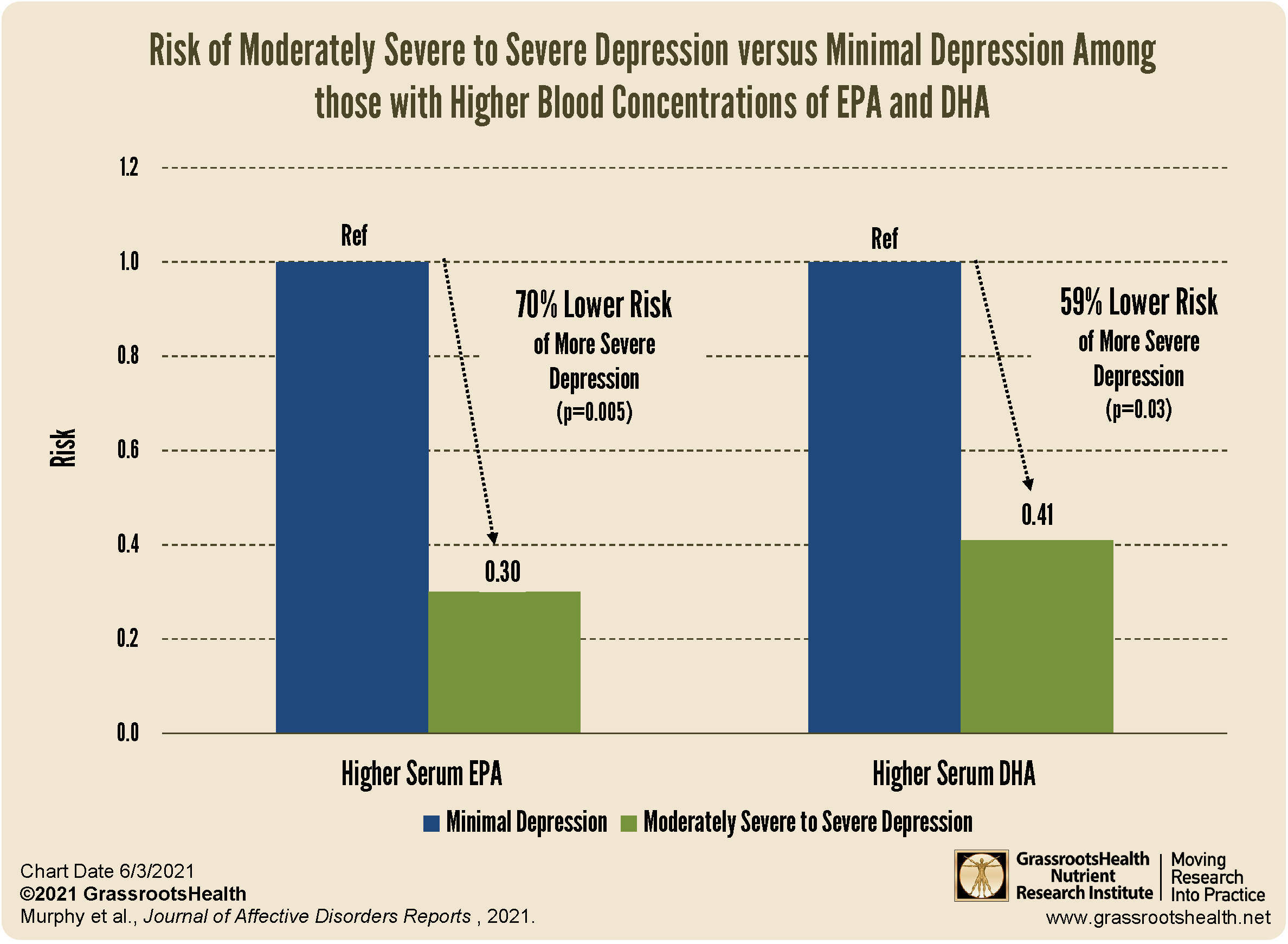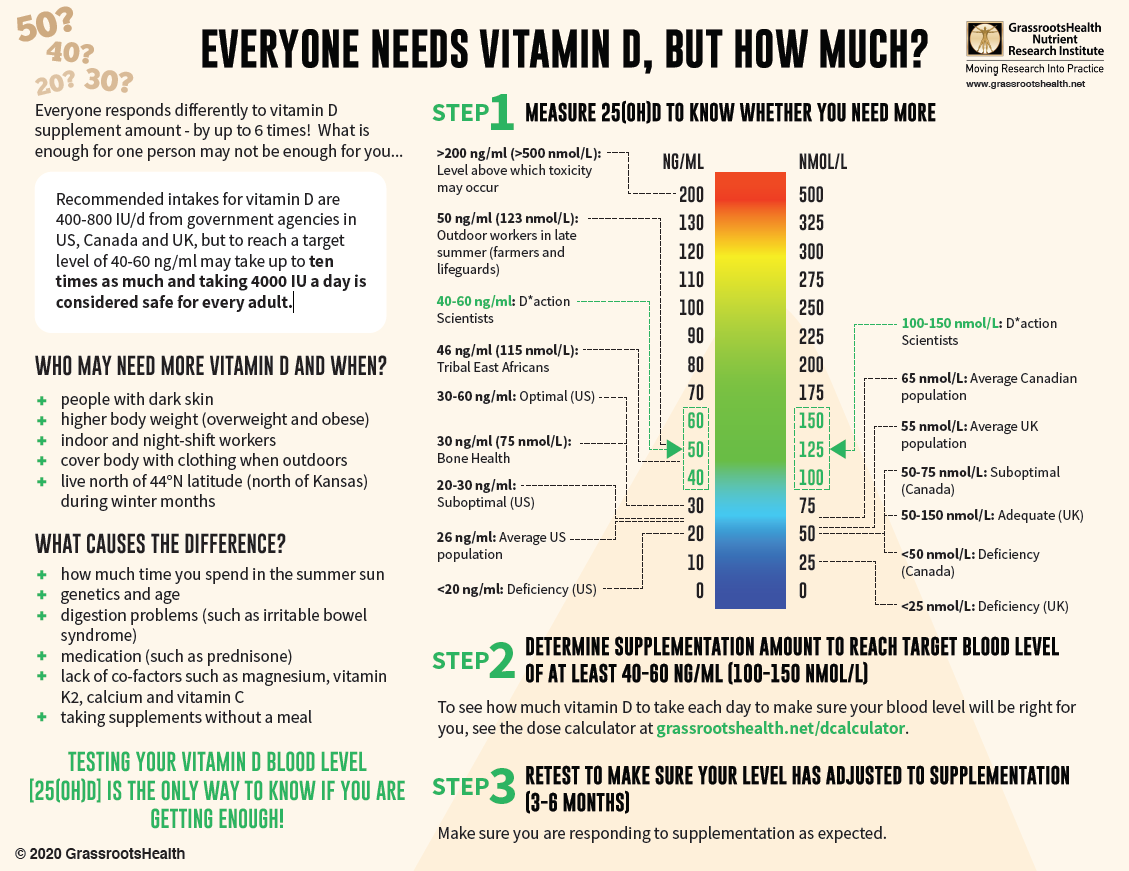Published on June 7, 2021
Analysis of NHANES 2011-2012 data shows a significantly reduced risk of more severe depression with higher levels of omega-3 fatty acids
 Depression is a common mental disorder that affects more than 300 million people worldwide and is the leading cause of disability. In fact, depressive symptoms can affect just about anyone at any time with varying degrees of interruptions to daily life. A recent analysis of the 2011-2012 National Health and Nutrition Examination Survey (NHANES) data set showed that, of 1186 adults surveyed in the United States, 14.3% reported mild depressive symptoms, 5.06% moderate, and 2.75% moderately severe to severe depressive symptoms.
Depression is a common mental disorder that affects more than 300 million people worldwide and is the leading cause of disability. In fact, depressive symptoms can affect just about anyone at any time with varying degrees of interruptions to daily life. A recent analysis of the 2011-2012 National Health and Nutrition Examination Survey (NHANES) data set showed that, of 1186 adults surveyed in the United States, 14.3% reported mild depressive symptoms, 5.06% moderate, and 2.75% moderately severe to severe depressive symptoms.
In past blogs, we have discussed the association between depression and magnesium, vitamin D, and omega-3s. Our last post featured a video by Dr. Bill Harris on omega-3s and anxiety and depression. Today, we are reviewing one of the latest studies on omega-3 fatty acids and depression.
Previous Study Shows Strongest Evidence for Omega-3s and Depression
The world’s largest review (called a meta-synthesis) of nutrient supplements and mental disorders published by Firth et al. examined 33 meta analyses of randomized controlled trials on dietary supplements and mental health. The analysis included data from 10,951 individuals with diagnoses such as depression, stress and anxiety, bipolar, personality disorder, schizophrenia, and attention-deficit/hyperactivity disorder (ADHD). The strongest evidence from this review showed the effect of omega-3s (with an average dose of 1422 mg/day of EPA) on reducing symptoms of major depressive disorder, which produced benefits beyond those of taking antidepressants alone. The strongest effect was seen with omega-3 supplements that contained at least 50% EPA.
New Analysis Compares Blood Levels of EPA and DHA to Depression Scores
A study by Murphy et al. looked at the NHANES 2011–2012 data set to determine the association between concentrations of EPA, DHA, and total long chain omega-3 fatty acids in the blood and the severity of depression symptoms. Depression was categorized as minimal, mild, moderate, and moderately severe to severe, with an additional assessment of the impact of depressive symptoms on daily life.
Overall, there was an inverse relationship between long chain fatty acid concentration in the blood and depression scores, such that the risk of moderately severe to severe depression decreased with higher levels of omega-3 fatty acids in the blood, and the association remained significant after adjustments were made for sex, age, race/ethnicity, education, marital status, poverty to income ratio, and smoking status.
The charts above show the reduced risk of moderately severe to severe depression versus minimal depression among individuals with higher blood concentrations of EPA and DHA. EPA specifically was found to have a significant relationship to depressive symptoms, with a 70% decreased risk of moderately severe to severe depression versus minimal depression for those with higher EPA levels (p=0.005), and a 61% decreased risk of very or extreme difficulty with daily tasks due to depressive symptoms (p=0.05).
Higher levels of DHA were also significantly associated with a lower risk of moderately severe to severe depression relative to minimal depression, with a 59% reduced risk (p=0.03), suggesting that both DHA and EPA omega-3 fatty acids are important for mental-emotional wellness.
What Level of Omega-3s Should You Aim For?
In studies using a measurement called the Omega-3 Index test, individuals with a low Omega-3 Index were shown to have a 10-fold higher risk of death compared to those with a high index. The Omega-3 Index records the percentage concentration of omega-3s EPA and DHA in red blood cells. An Omega-3 Index between 8% and 12% was associated with lower risk for death from cardiovascular disease, versus an index less than 4%.
Higher omega-3 levels, with an Omega-3 Index of at least 8%, have also been associated with heart health, a longer life, brain health, breast cancer, reduced inflammation, and even an improved immune response to viral infection. Unfortunately, due to the Western diet, a majority of the population has omega-3 levels that are below what is recommended for health; in fact, 82% of GrassrootsHealth participants have an Omega-3 Index level below the recommended 8%.
What can you do to make sure you are getting enough?
Check Your Omega-3 Index and Your Vitamin D Level Today!
By enrolling in the GrassrootsHealth D*action+Omega-3 Project, you can measure your Omega-3 Index and your level of vitamin D. Vitamin D is also very important for mental-emotional wellbeing, as is magnesium among others. Ensuring you are getting enough of each of these essential nutrients by testing your levels could be your first step towards improving your mood and easing depression and anxiety.
Vitamin D is also very important for mental-emotional wellbeing, as is magnesium and several other essential nutrients. Ensuring you are getting enough of each of these essential nutrients by testing your levels could be your first step towards improving your mood and easing depression and anxiety.
When it comes to vitamin D especially, correcting a deficiency at any age and any time of life can decrease potential disease severity and improve outcomes. With almost 90% of the general population having vitamin D levels below the recommended 40-60 ng/ml (100-150 nmol/L), it is obvious that most people need more vitamin D. While most of us cannot achieve a vitamin D level of 40-60 ng/ml from sun alone, either due to our lifestyle, where we live, or other circumstances, we can certainly reach those levels with the right amount of supplementation.
Below is a guide for how much you might need, and who may need more. Your levels can be tested safely at home – order your home test kit today.
By joining the GrassrootsHealth projects, you are not only contributing valuable information to our study, but you are also gaining knowledge about how you could improve your own health through measuring and tracking your nutrient status, and educating yourself on how to improve it. Do you know what your status of vitamin D, omega-3s, and other essential nutrients is? Could your levels be improved? Test now to find out!
 We now have a NEW GIFTING SERVICE that allows you to quickly send ‘Gift Cards’ to friends, family and coworkers who you consider might need immediate access to testing, and to Claim the Joy of Your Health TODAY. Give the gift today!
We now have a NEW GIFTING SERVICE that allows you to quickly send ‘Gift Cards’ to friends, family and coworkers who you consider might need immediate access to testing, and to Claim the Joy of Your Health TODAY. Give the gift today!








